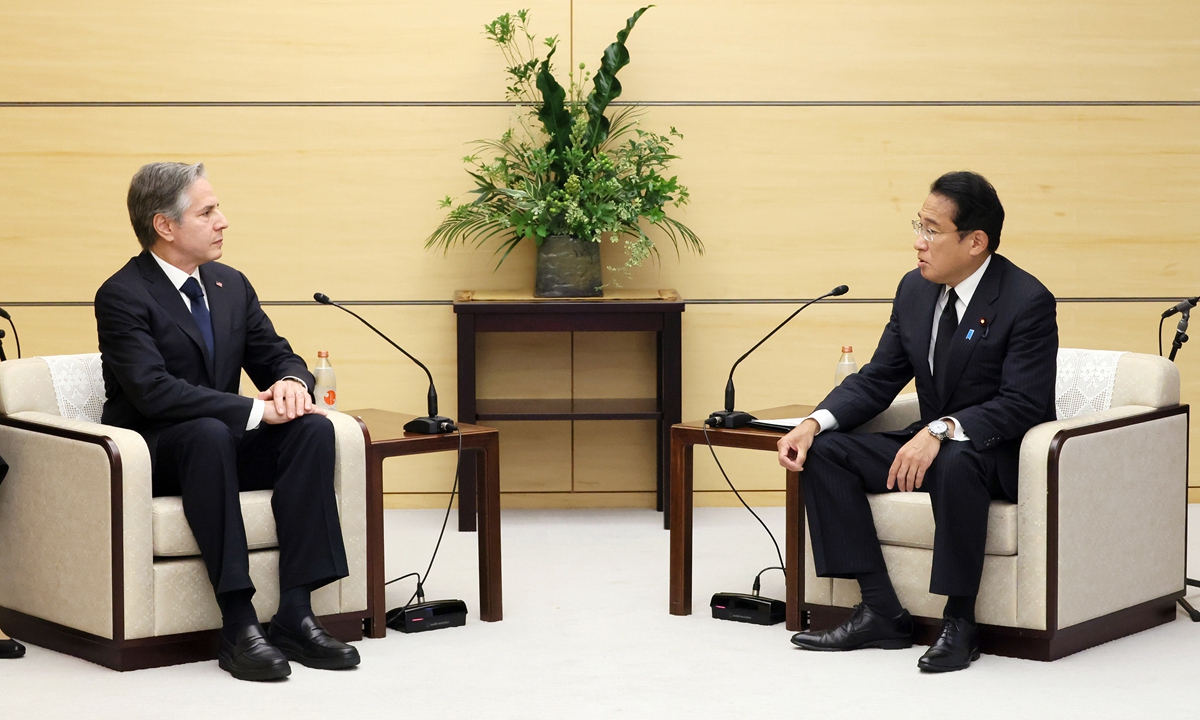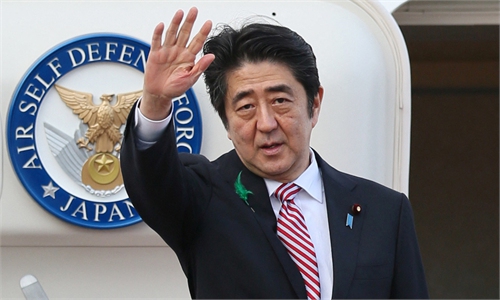In ‘high-profile’ mourning of Abe, Blinken’s blitz Tokyo visit serves to tie Japan closer as US policy trumpeter in Asia

US Secretary of State Antony Blinken (L) meeting with Japan's Prime Minister Fumio Kishida at the Prime Minister's official residence in Tokyo, Japan, 11 July 2022. Photo: The Paper
US Secretary of State Antony Blinken on Monday paid a blitz visit to Tokyo to mourn assassinated former prime minister Shinzo Abe, after President Joe Biden ordered US flags to be flown at half-staff to pay tribute to this important political figure in Japan.
The high-profile commemoration of a former Japanese PM by the US government highlighted the great importance that Washington attaches to Tokyo in serving US geopolitical concepts in Asia, observers said, warning that an upgraded US-Japan alliance could encourage Japan to be more aggressive.
In one tweet about a moment of silence he led with the US embassy in Japan, Blinken said "…His (Abe) legacy will continue to endure with future stewards of the US-Japan Alliance."
"We are deeply saddened over the killing of one of our dearest friends. The US-Japan Alliance will always remain strong," Blinken posted in another tweet alongside pictures of him with Prime Minister Fumio Kishida and a meeting of officials from both sides.
Lü Chao, director of the Institute of the US and East Asian Studies at Liaoning University, described the US reaction as a rare high-profile one, as it wants to seize the opportunity of Abe's death to draw Japan closer.
The US hopes Japan will continue to be a hatchet man to serve its geopolitical goals in the Asia-Pacific, including the QUAD and Indo-Pacific Economic Framework for Prosperity (IPEF), Lü told the Global Times on Monday.
Da Zhigang, director of the Institute of Northeast Asian Studies at Heilongjiang Provincial Academy of Social Sciences, said the US is mourning the loss of a "friend and trumpeter for the US" on its Indo-Pacific Strategy and provocations related to the Taiwan question.
For Japan, it needs US support to free itself from the restraints of the post-WWII world order imposed on the country and increase its international presence, said Lü, warning that the right wing in Japan will become more active and aggressive using the excuse of "carrying forward Abe's legacy."
Both Japan and the US are seeking benefits by upgrading the US-Japan alliance, but the US is being short-sighted in indulging the expansion of Japanese right-wing forces, which have never recognized their historical faults, Lü said.
The US has made a serious mistake to think that Pearl Harbor was now history, and has forgotten that rearing a tiger is courting calamity, the expert said.
At Monday's routine Chinese Foreign Ministry press briefing, an NHK reporter asked for China's comment on the election result and the reality that those supporting a revision of the pacifist constitution have taken a majority of over two-thirds in both houses — the threshold that must be met for any revision to Japan's postwar pacifist constitution to be initiated.
Chinese Foreign Ministry spokesperson Wang Wenbin said that due to historical reasons, Japan's potential constitutional amendment has drawn great attention from the international community and Asian neighbors.
"We hope Japan can learn from history and stick to the path of peaceful development," Wang said.
Prime Minister Kishida said at a press conference on Monday that his country will substantially enhance its defense forces in five years, following the sweeping victory of Japan's ruling Liberal Democratic Party in Sunday's upper house election.
There have been calls from domestic opposition parties for Japan to acquire nuclear submarines "to boost defense capabilities," to which Kishida showed a cautious stance, local media reported in June.
After Abe's death, experts asked if Kishida would be able to overcome extreme voices outside and inside the ruling coalition and unite the government.
While Abe had flexibility in hedging his bets between China and the US, and the courage to repair ties with China if he deemed it necessary and beneficial, Kishida may not be able to do the same, they said.
Abe's death has definitely changed Japan's domestic politics and had a ripple effect on regional security, particularly in East and Northeast Asia, Lü Chao said, calling on all regional countries to be alert over Japan's future acts under US support.
On top of Blinken's whirlwind visit, Yoon Suk-yeol, president of South Korea, another US ally in Asia which has a historical feud with Japan, will visit a memorial altar set up for Abe at the Japanese embassy in Seoul, KBS reported. South Korea will also send a condolence delegation to Japan.
Chinese Vice Foreign Minister Ma Zhaoxu on Monday paid a visit to the Japanese Embassy in Beijing to express condolences on behalf of the Chinese government over Abe's death.
Wang Wenbin said at the Foreign Ministry press briefing that China has not received the Japanese government's official notice on Abe's funeral arrangements and will consider the matter upon receiving such a notice, when he was asked whether Chinese officials would attend the late prime minister's funeral.

